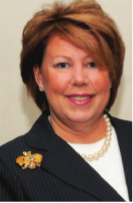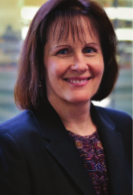Six Women of Alternative Finance
If alternative lending had a wide enough lens for a selfie, what a richly layered portrait would appear. Every demographic group would be represented in the growing leadership ranks.
Imagine zooming in on that sea of faces to a select group of senior executives. Following are candid close-ups of six first ladies of finance.
 Heather Francis,
Heather Francis,
Merchant Cash Group
Merchant Cash Group, established in 2008 and based in Gainesville, Florida provides credit accessibility to small to midsized business owners through the purchase and sale of future receivables. The company is focused on improving clients’ risky credit profiles and building relationships with borrowers and affiliates.
Executive Vice President Heather Francis earned a degree in Health Promotion and Education from the University of Florida, a background that has served her well in alternative lending. Both health care and financial services rely on the skill of customer-facing professionals to foster customer longevity, she said.
“Success in any sales organization, health care or financial services, begins and ends with the customer,” Francis said. “We don’t have a sales force. We’re strictly here to fund. One of our favorite sayings is that most people don’t have to work with us. We want them to want to work with us.”
Merchant Cash Group trains and mentors its agents. Stephen Covey’s Seven Habits of Highly Effective People is embedded in the corporate charter.
“Most people will tell you that I’m approachable,” Francis said. “Being responsive is part of our culture. We care about each other and we want to win. Playing softball from the time I was 8 to 20 years old taught me the value of teamwork. I’m also fortunate to have worked with a boss in financial services who has mentored me and helped me grow under his leadership.”
 Candace Klein,
Candace Klein,
Dealstruck
Dealstruck, established in 2012, is a crowdlending company based in San Diego that offers a mix of peer-to-peer and traditional financing offerings to the market of borrowers between those that are bankable to those that are forced into sub-prime. The company’s mission is to help business owners improve creditworthiness over time and ultimately become eligible for less expensive, more conventional forms of financing.
Candace Klein, chief strategy officer, is a practicing attorney who received a B.A. from Northern Kentucky University, and J.D. from the Salmon P. Chase College of Law.
Prior to joining Dealstruck, Klein co-authored the JOBS Act which legalized crowd funding for securities in the United States, and was founder and CEO of Bad Girl Ventures and SoMoLend. Klein, an advocate for female entrepreneurship, serves as General Counsel for Women Investing in Women, a global NGO focused on increasing access to capital for women business owners and access to capital markets for women investors.
Klein considers her securities law background an ideal entrée to alternative lending, particularly due to both industries’ reliance on data analytics.
“I’m a big believer in metrics,” said Klein, “and I’m constantly thinking about how we can increase conversion rates. My goal is to find the right financial resource for every person who is seeking funding and to be increasingly able to measure that goal.”
Klein manages conversion metrics at Dealstruck, where customer experience is a top priority.
“We’re an online platform so our borrowers and investors often touch technology before they ever meet a human,” Klein said. “We want people to get to us easily and seamlessly. We spend a ton of time educating our borrowers on cost differences between cash advance and loans. We strive to find the best possible products to fit customer risk profiles, and that drives us to continually innovate and expand product offerings.”
Describing her management style as empowering, Klein admitted that some staffers may call it “over-delegating.” She encourages employees to think of themselves as CEOs.
 Lisa McGreevy,
Lisa McGreevy,
Online Lenders Alliance
Online Lenders Alliance is a trade association based in Washington, D.C., dedicated to advancing best practices in online lending. Established in 2005 by a small group of Internet lenders seeking better standards and governance, the alliance works closely with local and federal government to shape policies that are favorable to its member companies.
President and CEO Lisa McGreevy is well-connected in Washington. As a high-profile lobbyist and one of the “Most Powerful Women in Washington,” her experience working in the White House, Treasury Department, and Capitol Hill, has been an asset to the Online Lenders Alliance.
For almost a decade she has led the association’s growth, advocating on behalf of its members, and actively participating in every initiative in the group’s expanding ecosystem.
“We are innovators in online financial services,” McGreevy said. “That means we’re at the cutting edge of delivering credit. Unfortunately, state and federal laws have not kept pace with demands for credit and the technology available for them to obtain it. Consequently, regulators and lawmakers are trying to play catch-up and all too often consider laws and regulations that hinder, instead of promote, innovation in the financial services marketplace.”
McGreevy added that changes in the online lending ecosystem have prompted the Online Lenders Alliance to broaden its focus from traditional short-term, small-dollar consumer loans to include all online financial services.
“OLA is innovative, entrepreneurial, and relentlessly focused on serving our members,” McGreevy said. “The nimbleness of our members has given us the platform to adapt to changes in the marketplace, regulatory environment, and needs of our membership and their customers.”
 Maria Espinel,
Maria Espinel,
Credit Cash LLC
Credit Cash LLC, a New York-based cash advance company, was founded in 2006 by Entrepreneur Growth Capital, an asset-based lender managed by three generations of financiers since 1937. Credit Cash, an innovator in the use of a lock box by a cash advance company, provides customized funding products to upscale clients with good to excellent credit.
Chief Operations Officer Maria Espinel’s career in asset-based lending began at Abrams & Company, followed by senior management positions at United Credit Corporation, Finova Capital, and EGC, parent company of Credit Cash. Espinel graduated from Baruch College and is co-chair and past president of the Commercial Finance League.
Espinel was a pre-med student when she was initially approached by a finance company and offered a different career path.
“This was a great match,” Espinel said, “since mathematics is my strong suit. I was also fortunate to have a strong mentor at this company. At the time, I didn’t recognize that this mentorship would lead to a 30-year career in asset-based lending and merchant cash advance.
At Credit Cash, I’ve enjoyed working with three generations of owners. Back in 2004, when the asset-based loan market was getting competitive due to banks’ relaxed lending standards; we started looking at alternative lending platforms. The MCA industry was relatively new and targeting small business. So we began offering advances to larger businesses, an area that we knew how to underwrite. Our goal from the onset was to attract larger clients with better credit.”
Espinel described her management style as “permissive autocrat,” mindful of individual employees and the company’s best interests.
 Carrie Dolan,
Carrie Dolan,
Lending Club
Lending Club, established in 2006 and headquartered in San Francisco, is an online credit marketplace that matches creditworthy borrowers with investors looking for yield. Lending Club opened with one simple mission: create a more efficient, transparent and customer-friendly alternative to the traditional banking system.
Chief Financial Officer Carrie Dolan has seen loan volume double every year since the first loan was facilitated in 2007. More than $5 billion in personal loans have been originated through the Lending Club platform, $1 billion during the second quarter of 2014 alone, enabling more than 362,000 consumers to achieve their financial goals.
“In March 2014, Lending Club launched a small business loan platform,” Dolan said, “with loans available up to $100,000, and in April we announced the acquisition of Springstone Financial, which offers financing to prime consumers looking for educational or patient financing. In May we announced our first alliance with a top-20 bank, Union Bank.”
Dolan earned her B.S. and MBA in finance from the University of California, Berkeley, and worked at two publicly held companies before joining Lending Club. At Chevron she helped launch Chevron Credit Bank where she served on its board of directors and as chief financial officer. She served as treasurer at Charles Schwab and chief financial officer at Schwab Bank, a bank she helped launch in 2003.
“With a fast growing culture, my role is to help solve problems quickly,” Dolan said, “bridge communications, and quickly adjust resources. I need to stay flexible and collaborative, but also know when to step in to provide more guidance.
“In early 2013, Lending Club announced that it wanted to be prepared to go public by the end of 2014, as markets permitted. As CFO, I’d manage the initiatives that would help us be ready for life as a public company: hiring, scaling, automation, procedure development, documentation and other activities intended to de-risk our business. My goal is to ensure we have the financial depth and breadth to support the company as we grow.”
 Chaomei Chen,
Chaomei Chen,
Lending Club
Lending Club’s chief risk officer, Chaomei Chen, graduated from The Southwestern Jiao Tong University of China before moving to the U.S. where she earned an M.S. at Johns Hopkins University.
She has overseen business and credit risk within portfolios totaling more than $20 billion for companies including Providian Financial, the Washington Mutual Bank portfolio at JP Morgan Chase Card Services, and FleetBoston.
In her current role as chief risk officer at Lending Club, Chen is focused on establishing a risk management framework and infrastructure to support growth.
Risk management from Chen’s point of view is never a single measurement – it’s about mapping business objectives and aligning risk strategy appropriately.
“As chief risk officer I’d like to see this business continue to grow and provide great products and service to consumers, and continue to do so in a very responsible way that manages risk effectively,” Chen said.
Because she used to teach at the college level, she said she thinks of herself more as a coach than as a boss.
“My management style reflects that,” Chen said. “I give direction to the people on my team and trust them to implement collaboratively – and of course keep the lines of communication open to make sure we stay on track.”

Opportunities and threats
As a relatively young industry, non-bank finance faces increasing demand for its products and huge competition within its value chain. Additionally, its products and services are frequently misunderstood by borrowers. Despite their varying backgrounds and specializations, the executives expressed similar views about the industry’s opportunities and threats.
Managing growth was considered the top challenge, followed by the need to improve public perception. There was broad consensus on the need for educational outreach and brand recognition to boost alternative lending’s credibility.
The growth challenge
Managing growth is critical for any business and especially true for non-bank lenders striving to stay apace with an influx of new customers and seemingly limitless scalability.
“We just had our first billion dollar quarter (in the second quarter of 2014),” said Chen, “and topped $5 billion in loans originated through the platform. Making that milestone possible means we onboard five to 10 new employees every week. Growth is a challenge in itself but the bigger challenge is managing our risk levels and maintaining a solid return to our investors at the same time.”
Klein said that, just as in any marketplace, at Dealstruck, they struggle with balancing supply with demand.
“As a start-up company in rapid growth mode, we’re constantly looking at ways to streamline the borrower application process which may necessitate raising additional capital to build out the best lending base,” Klein said.
Francis agreed, saying that “extreme growth” taxes the system.
“At Merchant Cash Group the volume of incoming requests, leads, and deals can sometimes make us feel more reactive than proactive,” Francis said. “Getting back to being proactive sometimes requires bringing on new staff and developing faster software.”
An underwriter’s typical workday might include applications from a construction company, restaurant, janitorial service, and nail salon.
“A mental reset is required each time a new file is opened,” said Francis.
McGreevy said that the challenges in non-bank finance are similar to those faced by financial services as a whole.
“The marketplace is changing swiftly. The demand for innovative financial products over the Internet is increasing and government is way behind,” McGreevy said. “Consequently, non-bank professionals need to negotiate between the companies innovating quickly to meet a rapidly changing marketplace and working to bring regulators and lawmakers along.”
The people-don’t-get-us challenge
Non-bank finance is frequently misunderstood. There are no local branches and mistrust can be prevalent among borrowers.
“Online marketplaces like Lending Club don’t have a branch at every street corner to build trust through physical presence,” said Chen. “We need to build trust through different means.”
Chen said that building trust was the greatest challenge for Lending Club.
“We’ve achieved that goal by adopting a disciplined approach to credit and risk management, and offering great transparency into data and performance,” Chen said. “Our size is also now allowing us to attract large, demanding investors whose participation in our marketplace builds trust for other market participants. Newer or smaller marketplaces will continue to face the same challenge.”
Francis said that when it comes to trust, it is important to think about brand recognition.
“When you say bank, people think Wells Fargo, Bank of America. When you say alternative lending, there’s no immediate point of reference,” Francis said.
The Online Lenders Alliance works hard to address misconceptions and drive legitimacy throughout the non-bank lending ecosystem. Its efforts include education, communication, collaboration and advocacy with government and institutional leaders.
McGreevy called consumer protection a global phenomenon, noting that many U.S. laws and regulations are emulated in other countries, particularly in the United Kingdom, where consumer groups are very active.
“U.S. citizens are fortunate to live in a participatory democracy,” McGreevy said, “where they can express their views and petition the government for redress, as we recently did with Operation Choke Point.”
Operation Choke Point, a multiagency initiative by the Department of Justice, was designed to “choke off” access to the payments system by industries considered high risk for fraud.
A recent report by the House Government Oversight Committee concluded that the effort unfairly targets the online lending industry by intimidating banks into not processing transactions between lenders and their customers.
Espinel noted a slow but steady improvement in public perception of non-bank finance.
“When we were laying the groundwork [for cash advance] in 2004/2005 there was skepticism in the financial community,” Espinel said. “Back then, underwriting was not as sophisticated and there were higher default rates. Credit Cash was able to bring some old school credit work to our underwriting model.”
Espinel said that she is encouraged by the increasing level of professionalism in the industry, and that is continuing to attract more capital.
“Five years ago, few banks would entertain lending to this industry. Now some major banks are competing to get deals,” Espinel said.
Advice for a newbie
Non-bank finance is attracting new talent, many of whom seek advice from established professionals. McGreevy encouraged incoming professionals to develop their writing skills and learn the art of storytelling. Francis and Klein recommended researching prospective employers.
“Research, research, research,” said Francis. “Don’t go it alone. Call or email me if you’re considering a career move for current information on the company.”
Francis emphasized the importance of joining a reputable firm that supplements earnings during the inevitable learning curve when “you don’t want to be depleting your own pocket.”
“Just don’t stack,” Francis said. “Not only because I don’t believe in the practice, but because you could be accelerating the decline of a business. And never stop learning. Funding without understanding the market and the fundamentals of underwriting is pointless. This is a collaborative business, where we help each other.”
Espinel said she rarely sees stacking in her end of the market, but she believes that the practice is not in a client’s best interest.
“My advice to any career seeker is to work in a field for which you have a passion,” said Espinel. “Remember to always maintain the highest level of integrity. If you stay true to those virtues and are able to communicate to all stakeholders, you will succeed.”
Take a hard look at the management team, recommended Klein. Make sure that you’re comfortable with your prospective employer’s experience, maturity, and industry knowledge. Recognize that the greatest risk always lies in default. A strong risk management team well-versed in workouts and collections will protect and defend an agent’s hard-won portfolio.
Klein added that agents should take the time to explore ancillary revenue streams.
“There’s saturation at the top with non-bank lenders compared to the banking industry,” Klein said. “There’s so much opportunity in the midmarket and down markets to find ways to work with borrowers throughout the borrower lifecycle.”
Smile and say, Cheese!
Klein predicted better days ahead with democratized access to capital, increased transparency in lending, and funding professionals who are committed to growth.
Espinel sees a silver lining in the ongoing economic recovery.
“As difficult as the great recession was, the opportunities it helped create are vast,” Espinel said. “If you’re a self-starter seeking something a little different, then this can be a very rewarding path. There’s more flexibility here than in traditional finance, and you can be more creative.”
Go to: Previous page | Next page
Go to: | 1 | 2 | 3 | 4 | 5 | 6 | 7 | 8 | 9 | 10 | 11 | 12 | 13 | 14 | 15 | 16 | 17 | 18 | 19 | 20 | 21



